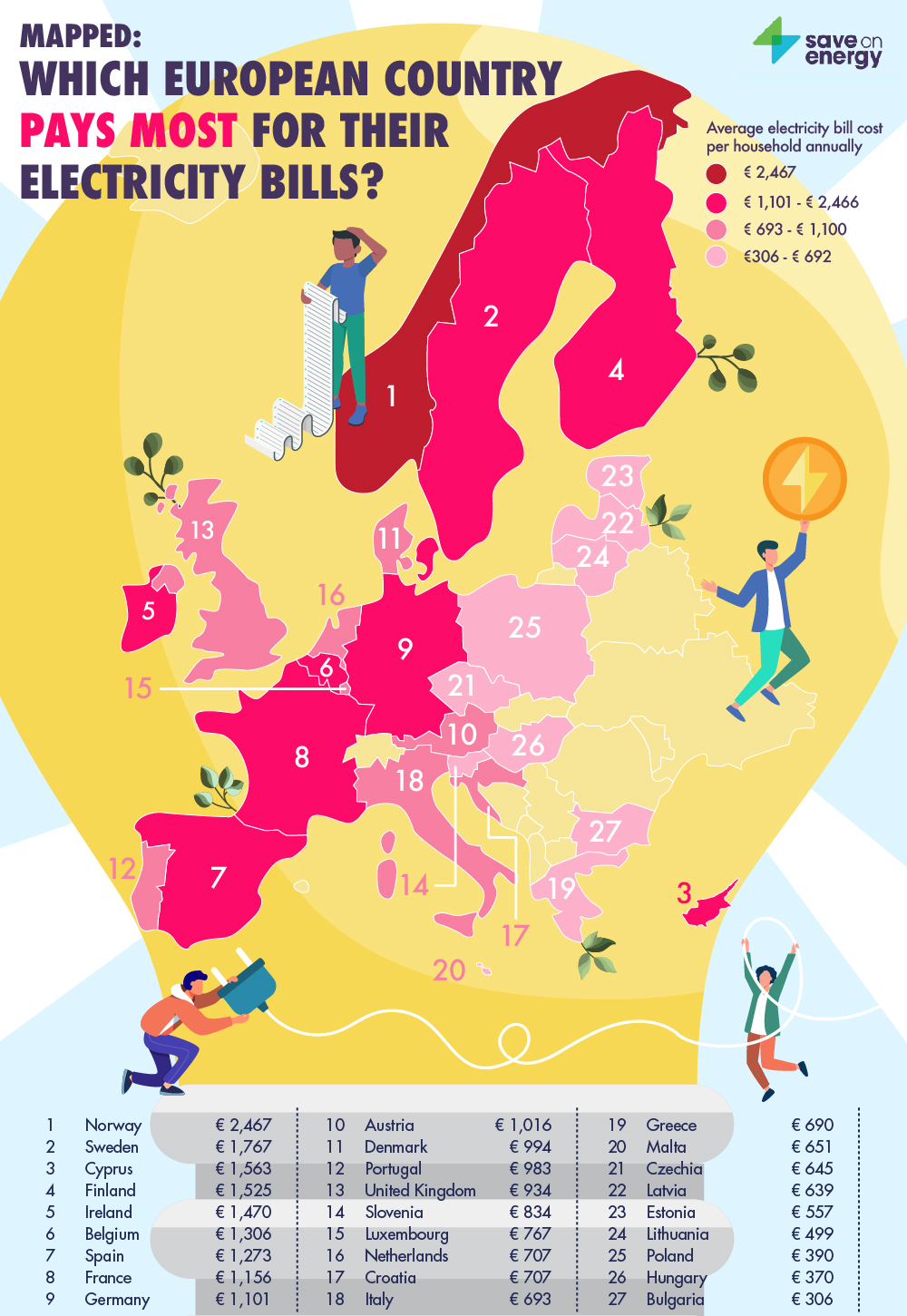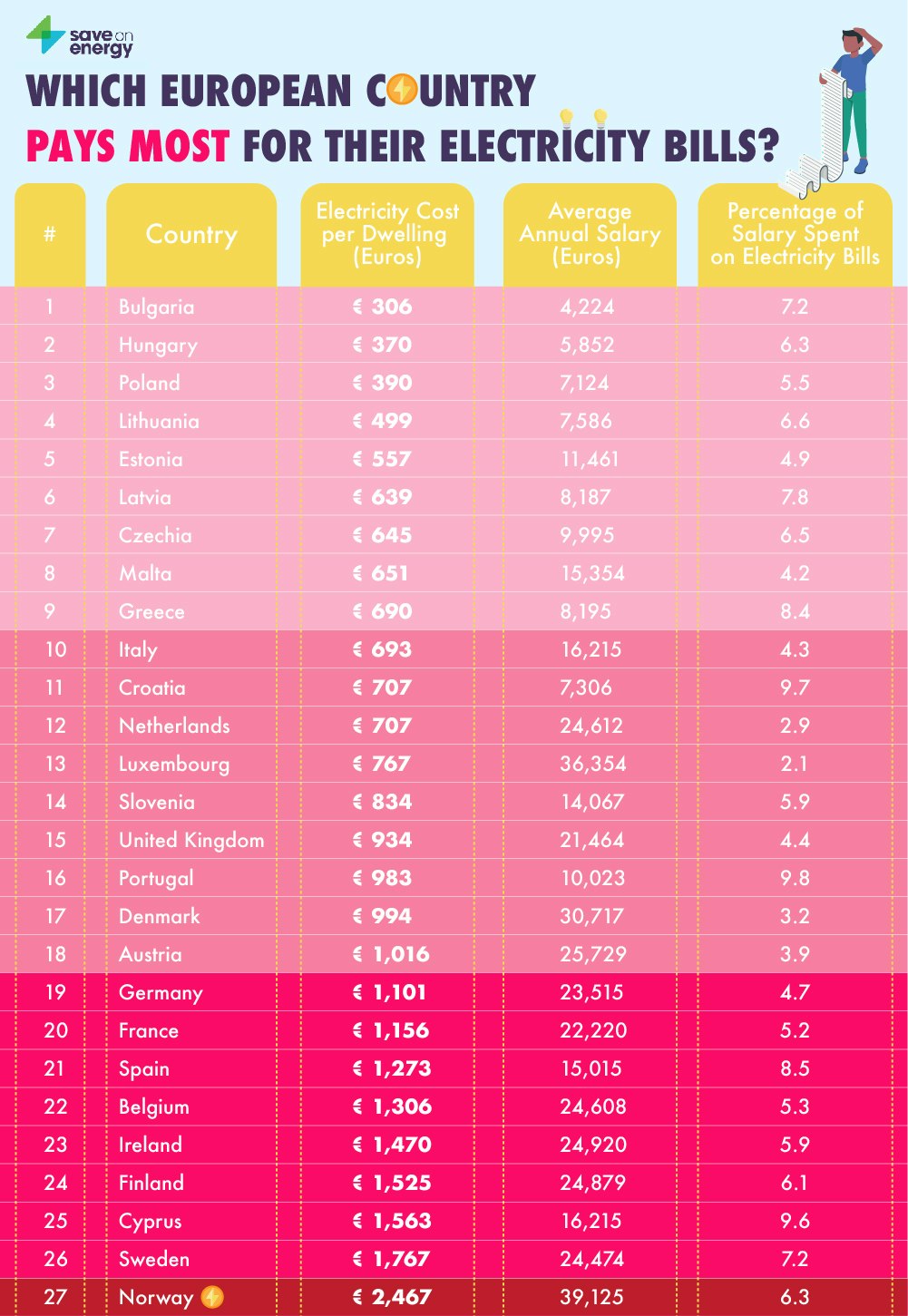Change language:
How much do electricity bills cost in each European country? – Hungary take a great position

It doesn’t matter where you are in the world, there’s one thing each country has in common: people love to moan about the cost of electricity.

Countries with the most expensive electricity bills
The most expensive electricity bill in Europe can be found in the Scandinavian country of Norway. Residents of this country can expect to pay a whopping €2,467 per year for their electricity – €2,161 more than Bulgaria who has the cheapest bill.
But despite being the most expensive electricity bill in the whole of Europe, when compared to the country’s average salary (€39,125), Norwegians can expect to spend 6.3% of their annual salary on electricity bills.
In second place is Norway’s immediate neighbour, Sweden. In this Scandinavian country, inhabitants can expect to pay €1,767 for their electricity bills each year – €700 less than Norwegians. Compared to the average annual salary (€24,474), residents of Norway can expect to spend 7.2% of their annual wage on electricity bills.
The third most expensive energy bill goes to Cyprus, with the average bill costing around €1,563, on average, per year. According to our research, the average Cypriot earns €16,215 per annum, which means they can expect to spend 9.6% of their salary on electricity bills – the third highest amount when taking average salary into account, just after Portugal (9.8%) and Croatia (9.7%).
In fourth place is Finland, with residents paying €1,525 for their electricity each year. As neighbours of first place Norway and second place Sweden, it seems Scandinavian countries have some of the highest electricity bills in Europe! Bearing in mind a Finnish native typically earns around €24,879 per year, on average, they can expect to spend 6.1% of their salary on their energy bills.
Ireland is the fifth most expensive of all European countries considered, with the country’s electricity bills racking up to €1,470 per year on average. When taking into account how much the average Irishman or woman earns (€24,920), residents in this country can expect to spend 5.9% of their annual salary on paying their electricity bills.
Countries with the cheapest electricity bills
The cheapest electricity bill in Europe can be found in Bulgaria, with the average cost per household being just €306 per year – a difference of €2,161 when compared to Norway who has the most expensive energy bills! When comparing this figure to the average salary of a Bulgarian national (€4,224), Bulgarians spend around 7.2% of their annual salary on electricity bills – this figure puts them among the top 10 of all countries considered.
Hungary is home to the second most affordable electricity bill in Europe, as our research found that the country’s electricity bills cost around €370, on average, per dwelling each year. If the country’s average salary is taken into account (€5,852), Hungarians can expect to spend 6.3% of their annual salary on their electricity bills.
Following closely behind Hungary is Poland, with the average electricity bill costing €390 per household each year – the third cheapest. When bearing in mind the average salary per annum for Polish inhabitants sits at €7,124, we can reveal that Poles spend 5.5% of their annual salaries paying off their electricity bills.
Fourth spot goes to Lithuania who pay €499 for their electricity bills, on average, per year. According to our research, Lithuanians typically earn in the region of €7,586 per year. Based on this, they can expect to pay 6.6% of their salary each year on electricity bills.
Estonia ranks in fifth place, with the average electricity bill costing households €557 per year, making it one of the cheapest electricity bills in the whole of Europe. However, when comparing this figure to the average annual salary of Estonians (€11,461), 4.9% of their annual salary is spent on electricity bills.
A full breakdown of the research:








